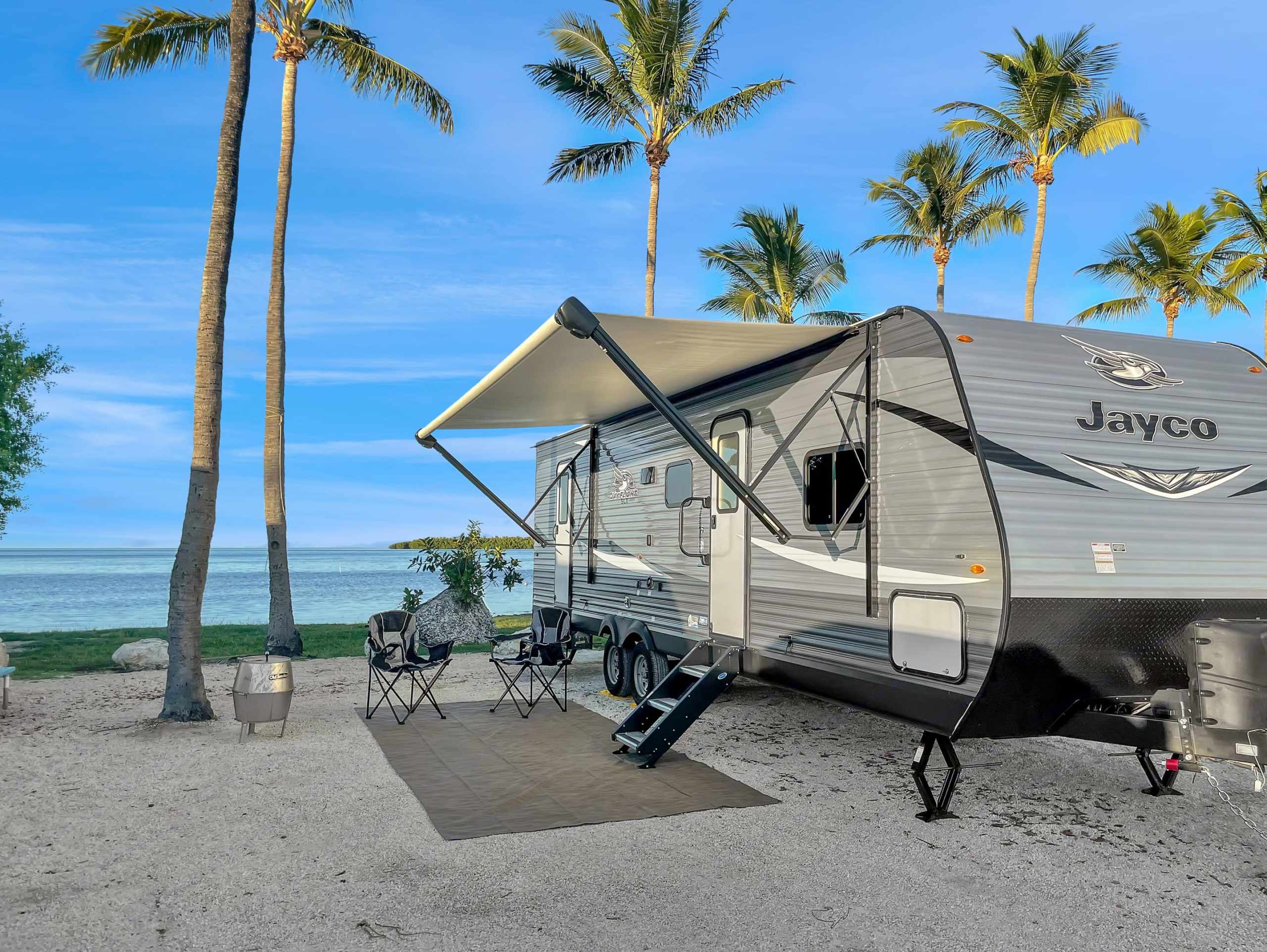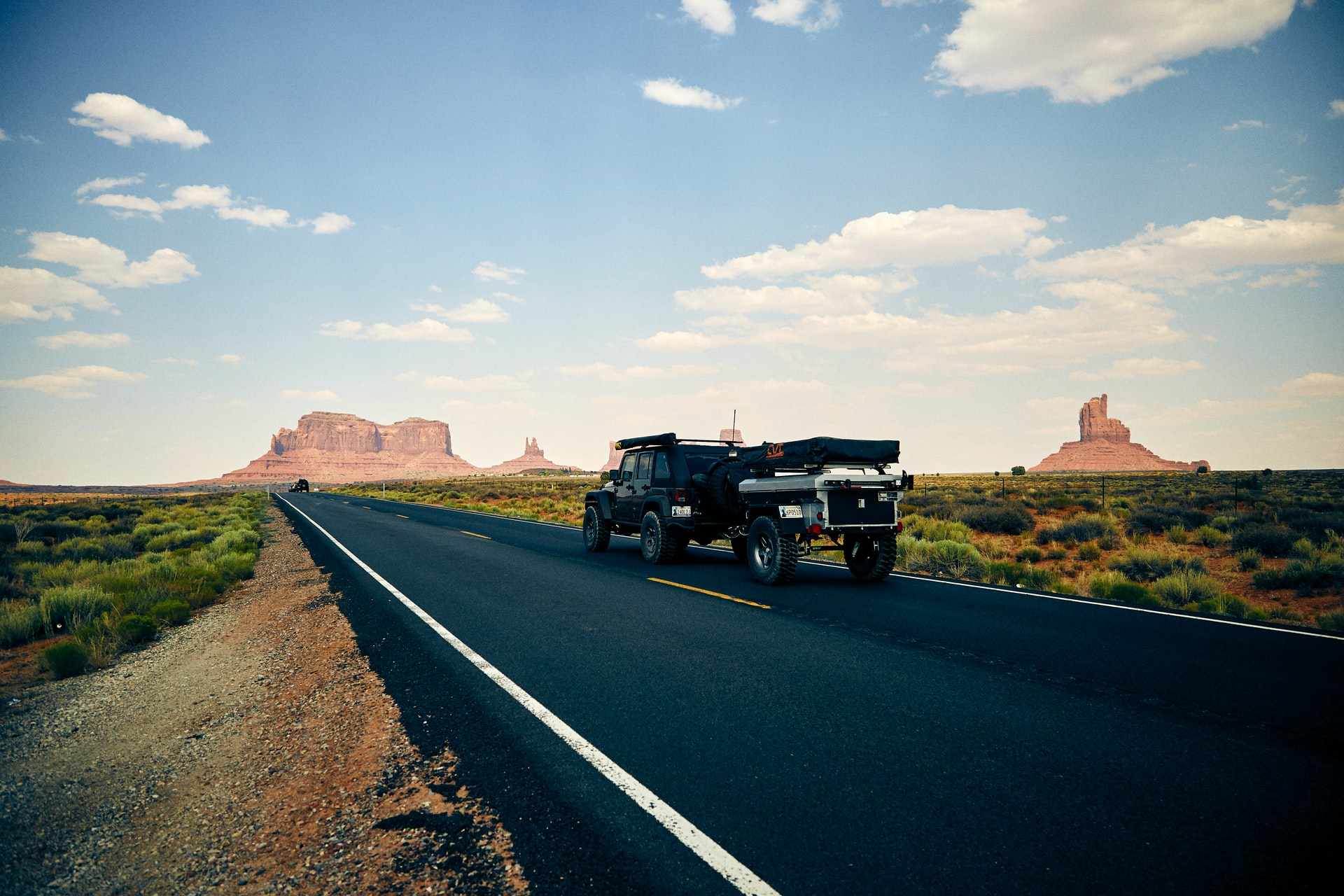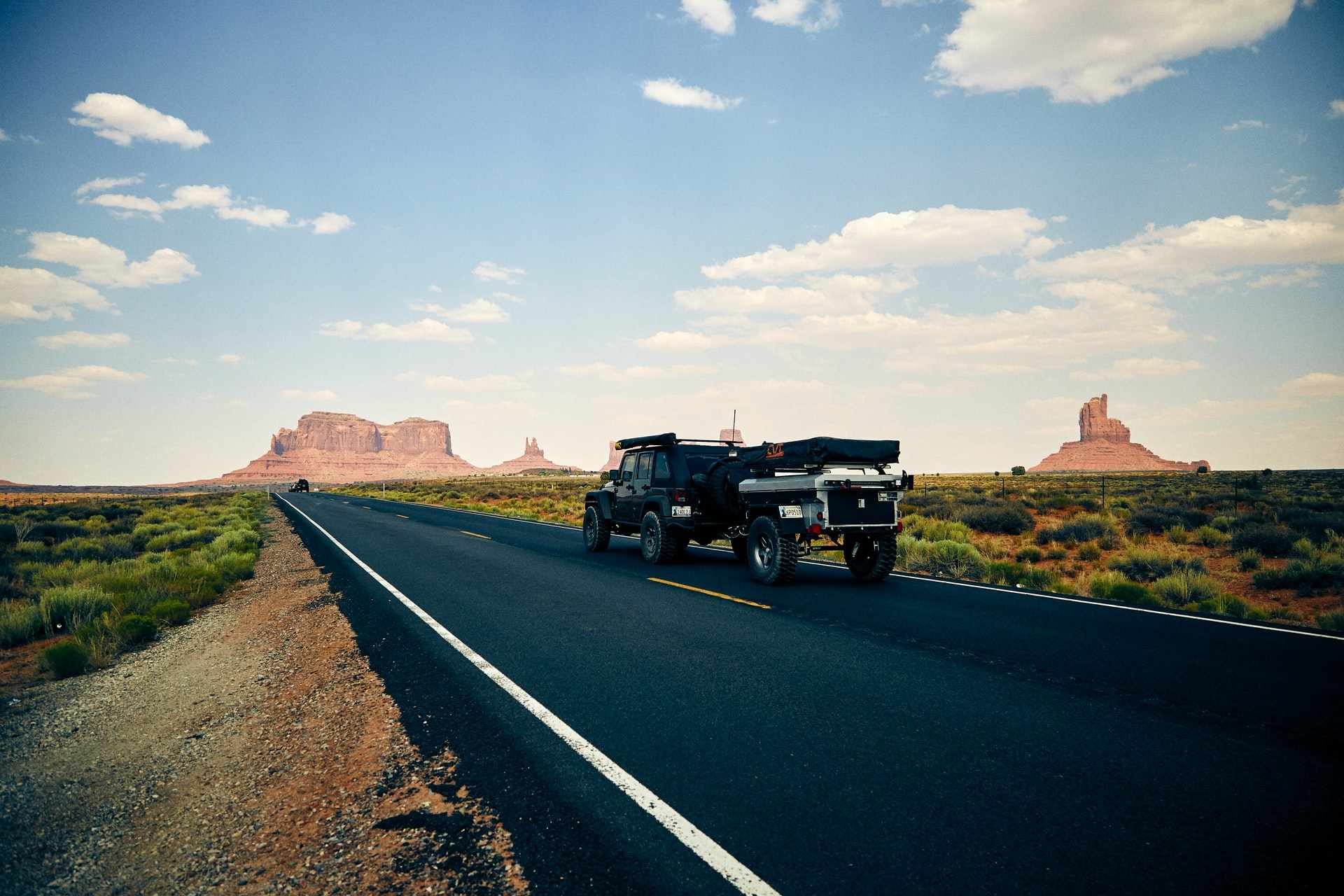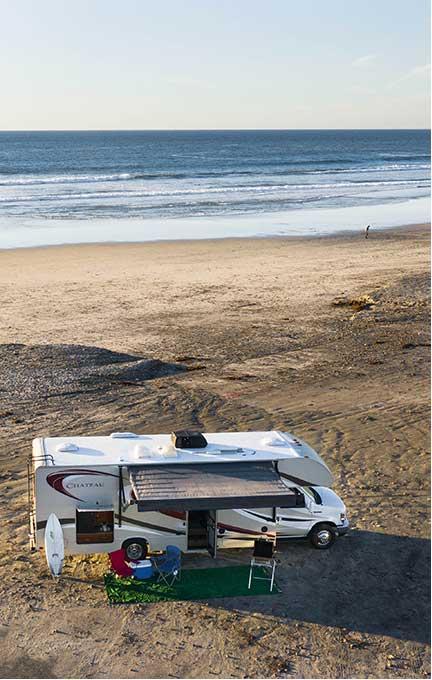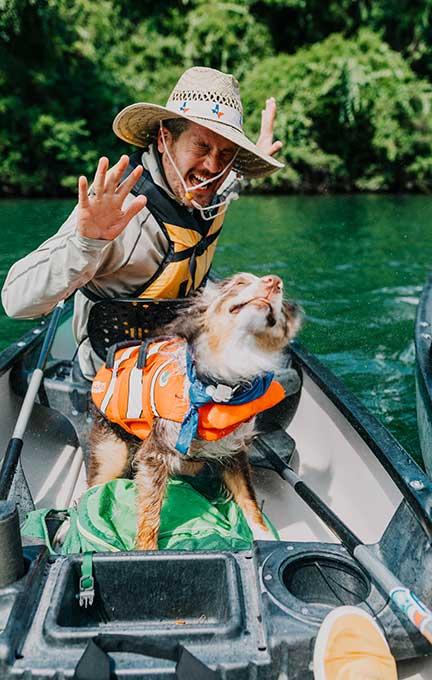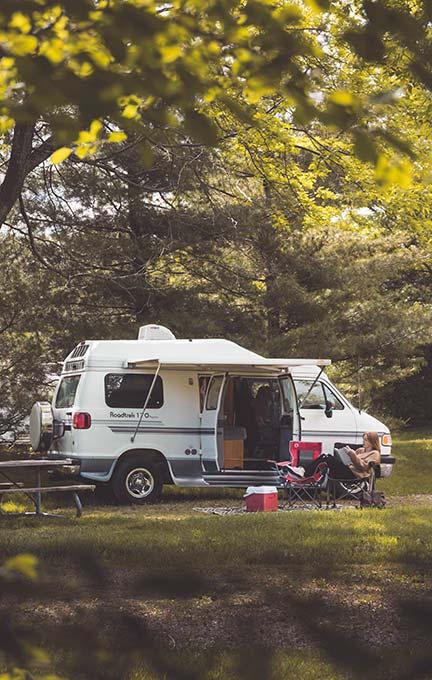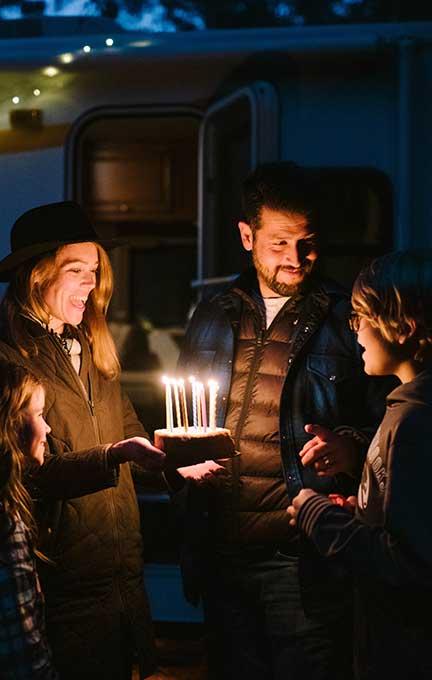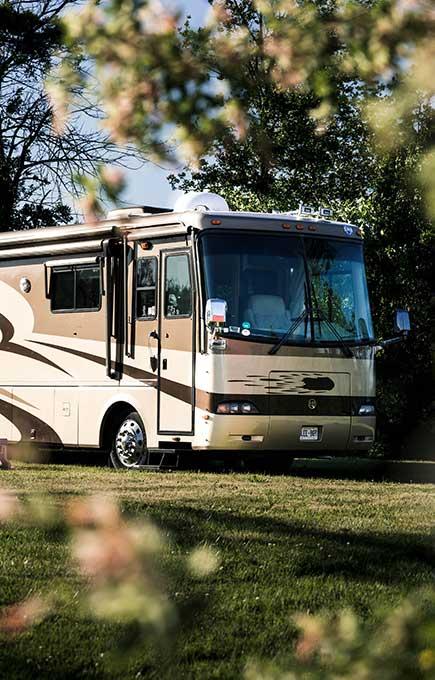Winter might seem like a bizarre time to camp in an RV. After all, RVs aren’t usually known for winter road trips because they tend to feature light insulation and freeze-prone pipes. A pop-up camper, for example, gets rough anytime the mercury dips below 40. Many RVs also aren’t equipped with snow tires or 4×4, making winter navigation a perilous proposition.
But this really is a shame because there are so many fun winter camping activities just waiting for the right RV!
From skiing to ice-fishing to snowshoeing to enjoying hot cocoa by an RV fireplace, winter RV activities and destinations are truly some of the most underrated out there. By planning a winter road trip in a properly-equipped RV, you can literally bring these winter wonders right to your doorstep.
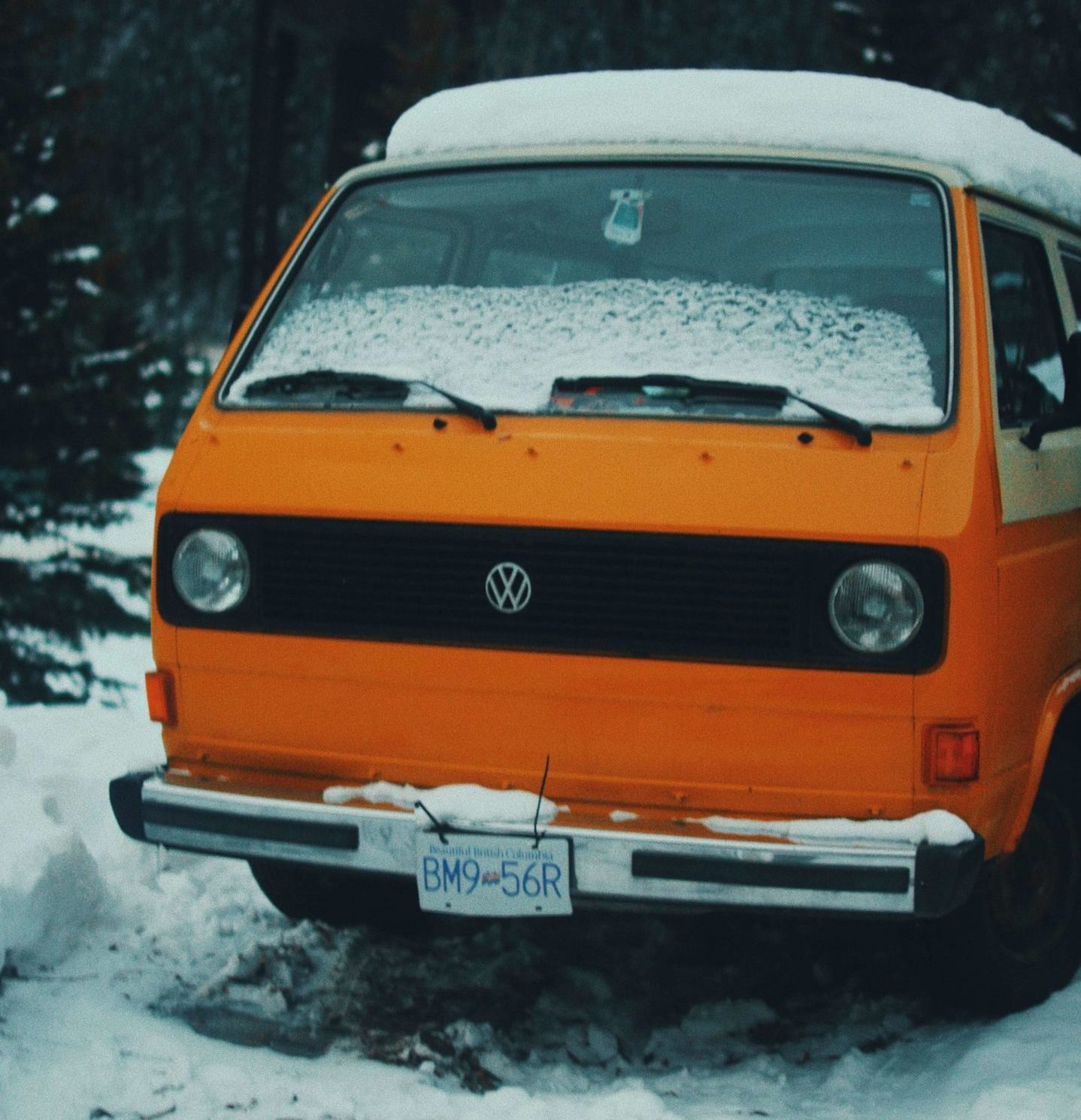
However, it’s important to understand the types of RVs you should look for to reach winter RV destinations. You’ll also want to know about the winter RV features that’ll keep pipes flowing and inhabitants warm.
Here at Outdoorsy, we have several types of rigs that’ll keep you and the family happy on a winter camping trip. Let’s check them out.
What to Look for in a Winter-Ready Rig
Before we get into our list of rigs that can take you to winter RV destinations, it’s important to understand the features to look for:
- Heated tanks – Water and sewer tanks in an RV are generally underneath the rig, making them prone to freezing. An RV that’s ready for a winter road trip will feature heated tanks to prevent this catastrophe.
- Insulated pipes – Pipes also run underneath the RV, so winter-ready rigs will heavily insulate the bays where the pipes run through.
- Four-season insulation – Winter-ready RVs will feature heavy-duty insulation designed to keep you warm in the bitterest of cold.
- Winter tires – The best winter RV is only as good as the tires that get you to your destination
- Winter windows – These will usually be dual-pane, but ultimately, any RV that is designated a “four-season RV” will have windows that can stand up to the cold.

What RVs Should You Look for on Your Winter Road Trip?
There are many rigs on our platform that are ready for your next winter RV destination. Here are nine great examples from our site:
Jayco Redhawk 26XD
This motorized RV will keep you warm on a fully self-contained winter road trip. It features a massive furnace for a rig this size, heavy-duty insulation, and its all-in-one construction means you simply spin around the driver’s seat when you reach camp to walk into your warm coach!
Forest River Arctic Wolf
The Arctic Wolf is one of the longest-built and most trusted models for winter RVing because it has the thickest insulation and innovative ways of circulating heat around the rig.
Jayco Eagle
Along with its beefy insulation, this rig is fitted with extra propane capacity to keep you warm when dry camping in the winter.
Heartland Bighorn Fifth-Wheel
This RV brings the luxuries of home to some of the coldest winter campsites. Featuring a 42k BTU furnace and an under-floor heating duct, you’ll stay warm in any winter RV destination.
Northwood’s Arctic Fox
When it comes to Alaskan truck campers, you won’t find much on the road outside of the Arctic Fox. That’s because, for decades, Northwood has set the standard for keeping people warm in the coldest winter RV destinations.
The Best Cold-Weather Winter RV Destinations
RVing in snowy destinations offers an unbeatable combination of adventure and serenity. Whether you’re carving down ski slopes or enjoying a peaceful winter wonderland, these destinations provide the perfect backdrop for an unforgettable cold-weather escape. Here’s an expanded look at some of the best snowy RV destinations:
Breckenridge, Colorado
Why Visit: Nestled in the heart of the Rockies, Breckenridge is a quintessential Colorado ski town with a charming downtown, world-class snow sports, and winter festivities.
Where to Stay: Tiger Run Resort is an RV favorite, offering full hookups, heated facilities, and easy access to the slopes.
Activities:
- Hit the slopes at Breckenridge Ski Resort for skiing and snowboarding on over 2,900 acres.
- Try snow tubing or sledding at the nearby Frisco Adventure Park.
- Explore the town’s festive vibe with ice sculpture competitions and après-ski dining.
Tips: Bring tire chains and ensure your RV is equipped for sub-zero temperatures.
Upper Peninsula, Michigan
Why Visit: This remote, snow-covered region is a haven for outdoor enthusiasts looking for a rugged and scenic winter experience.
Where to Stay: Tahquamenon Falls State Park offers limited winterized RV sites, but the views and serenity make it worth it.
Activities:
- Snowshoe through pristine trails with views of frozen waterfalls.
- Go ice fishing on one of the many lakes, such as Munising Bay.
- Enjoy snowmobiling on over 3,000 miles of groomed trails.
Tips: Stock up on supplies, as amenities can be sparse in remote areas.
Jackson Hole, Wyoming
Why Visit: Known for its rugged beauty, Jackson Hole combines luxury and adventure with some of the best winter scenery and activities in the U.S.
Where to Stay: RV parks like Fireside Resort or Jackson Hole Campground are close to the action and offer winter-friendly accommodations.
Activities:
- Ski or snowboard at Jackson Hole Mountain Resort, famous for its challenging runs.
- Visit nearby Yellowstone National Park for a winter safari, where you might spot bison, elk, and wolves.
- Soak in the Granite Hot Springs surrounded by snow-covered landscapes.
Tips: Arrive early to secure a spot and prepare for steep terrain if towing a trailer.
Lake Tahoe, California/Nevada
Why Visit: A sparkling alpine lake surrounded by snow-capped peaks, Lake Tahoe is perfect for RVers seeking both adventure and relaxation.
Where to Stay: RV-friendly spots like Tahoe Valley Campground offer year-round access with snow removal services.
Activities:
- Snowboard or ski at world-class resorts like Heavenly or Northstar California.
- Ice skate at scenic outdoor rinks such as Heavenly Village Ice Rink.
- Unwind by the campfire with stunning lake views as your backdrop.
Tips: Be aware of icy roads and check weather conditions before heading into the mountains.
White Mountains, New Hampshire
Why Visit: The White Mountains offer a picture-perfect New England winter experience with rolling hills, frosted trees, and charming small towns.
Where to Stay: Timberland Campground provides RVers with winter-ready sites and access to snow-filled activities.
Activities:
- Cross-country ski on miles of groomed trails at Bretton Woods or Great Glen Trails Outdoor Center.
- Drive the Kancamagus Highway, a scenic byway with breathtaking winter views.
- Enjoy local winter festivals featuring sleigh rides, ice carving, and traditional New England fare.
Tips: Pack plenty of layers and prepare for unpredictable weather in this region.
Winter RVing Tips
Winter RVing can be a magical experience, but it requires preparation to stay safe, warm, and comfortable. Here’s a comprehensive guide to help you handle cold weather RVing:
Winterize Your RV for Comfort and Safety
Insulate Your RV:
- Add insulation to windows using reflective bubble insulation (Reflectix) or thermal curtains.
- Use vent cushions to block heat loss through ceiling vents.
- Apply weatherstripping to doors and windows to seal drafts.
Protect Plumbing:
- Use a heated water hose to prevent freezing.
- Add heat tape to exposed pipes and insulate them with foam pipe covers.
- Keep the RV’s interior warm enough to prevent tank and pipe freezing.
Skirting: Install RV skirting around the base to reduce cold air under the RV, which can make it easier to maintain interior heat.
Heat Your RV Effectively
Use Multiple Heating Sources:
- RV Furnace: Run your RV’s built-in furnace, but keep in mind it can use a lot of propane.
- Space Heaters: Electric space heaters are efficient and reduce propane usage.
- Portable Propane Heaters: Safe for RVs if vented properly, such as the Mr. Heater Buddy.
Use Rugs and Mats: Lay down thick area rugs or mats to help insulate the floor.
Check Your Ventilation: To avoid condensation and carbon monoxide buildup, ensure your RV is ventilated properly. Use vent fans when cooking or heating with propane.
Protect Your Water System
Water Tanks and Hoses:
- Use tank heaters or add antifreeze to your gray and black water tanks (RV-specific antifreeze only).
- Disconnect and store your water hose when not in use to avoid freezing.
Power Management
Increase Battery Life:
- Cold weather drains batteries faster. Keep them charged and consider adding an extra battery or using a generator.
- Use a battery heater or store batteries inside when not in use.
Backup Power: Bring a portable generator or solar panels to supplement your power needs.
Stay Warm Inside
Layer Up: Dress in warm layers, and keep blankets or sleeping bags designed for extreme cold.
Block Off Unused Areas: Use thermal curtains or blankets to section off and heat only the areas you’re using.
Prepare for Snow and Ice
Protect Your Roof and Slides:
- Clear snow regularly to avoid excess weight and potential leaks.
- Invest in slide toppers to prevent ice buildup on slide-outs.
Maintain Your RV’s Exterior:
- Apply RV antifreeze to locks and seals to keep them functional.
- Use RV covers for tires and the body to protect against ice and snow damage.
Keep the Steps Safe: Use non-slip tape or step covers to avoid slippery steps when things get wet.
Driving in Winter Conditions
Tire Prep:
- Use all-season or winter tires if traveling in snowy conditions.
- Carry tire chains and learn how to use them before you need them.
Slow Down and Plan Ahead:
- Avoid driving in severe weather and check road conditions frequently.
- Keep extra distance between vehicles and brake gently to avoid skidding.
Emergency Kit: Carry essentials such as blankets, a flashlight, flares, a first-aid kit, and a portable shovel.
Stock Up on Supplies
Propane:
- Ensure you have plenty of propane for heating and cooking.
- Consider bringing an extra propane tank for extended stays.
Food and Water:
- Stock non-perishable foods and at least a 3-day supply of drinking water.
- Keep a portable camping stove for cooking in case of a power outage.
Manage Condensation
Ventilation is Key:
- Keep vents slightly open to reduce moisture buildup.
- Run a dehumidifier to prevent condensation on windows and walls.
Monitor Problem Areas: Check under mattresses and cushions for signs of dampness.
Have an Emergency Plan
Stay Informed:
- Monitor weather forecasts and have an alternate plan for severe storms.
- Download weather and road condition apps.
Know Your Route: Identify nearby RV-friendly facilities, propane refills, and emergency services.Stay Connected: Bring a cell phone booster or satellite phone for areas with poor reception.
The phrase winter RV destinations might sound like an oxymoron because many RVs aren’t equipped to beat the winter cold. But with the right preparation and an understanding of the right types of RVs for winter road trips, you and the family can open the door to exciting adventures this season.
